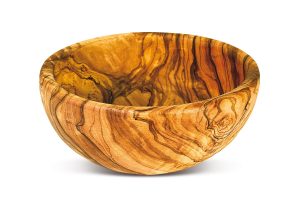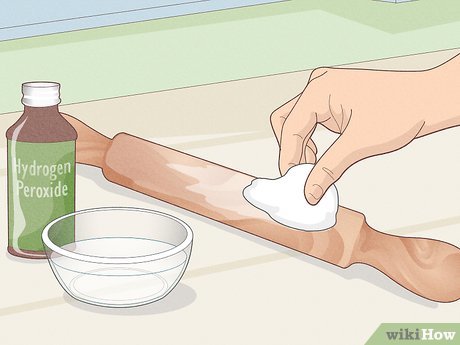Bowls made of olive wood are a lovely and distinctive addition to any house. But like all wood products, they require some special care to keep them looking their best. Here are a few tips on how to care for olive wood bowls:
1. Avoid exposing the bowl to extreme temperatures or direct sunlight, as this can cause the wood to crack or warp.
2. When cleaning the bowl, use only mild soap and water; avoid harsh chemicals or abrasive cleaners, as these can damage the finish of the wood.
3. To protect the bowl from scratches or other damage, always place it on a soft surface such as a towel when using it; Never place it directly on a table or other hard surface, such as a countertop.
4. Be sure to store the bowl in a dry place to prevent the wood from absorbing moisture and warping.
5. If the bowl becomes dry or dull-looking, you can revive its natural luster by rubbing it with a little olive oil using a soft cloth; be sure to wipe off any excess oil before using the bowl again. You may use your olive wood bowl for many years to come by following these straightforward instructions!
6. Avoid cutting on the bowl, use it only for serving food or displaying purposes.



Credit: artelegnospello.com
How Do You Care for Olivewood Bowls?
Olive wood is a beautiful, unique material that makes stunning bowls, cutting boards, and other kitchenware. But like any natural material, it needs to be cared for properly to ensure that it lasts for years to come. Here are some pointers for maintaining your bowls made of olive wood:
-Hand-wash it in warm water with a light soap. Avoid harsh detergents or abrasive scrubbers, as they can damage the wood. -Immediately use a soft cloth to dry after washing.
-Every few months, treat the bowl with a food-safe oil like mineral oil or beeswax to help keep it hydrated and protected from moisture. -Store far from direct sunlight in a place that’s cool and dry. With proper care, your olive wood bowl will give you years of beauty and enjoyment!
Read: Are Air Fryers Allowed in Dorms
Does Olive Wood Need to Be Oiled?
If you have olive wood utensils, cutting boards, or other kitchen items, you may be wondering if you need to oil them. The answer is yes! Olive wood is a beautiful material that can last for many years with proper care.
Here are a few tips on how to oil your olive wood items:
1. Use a food-grade mineral oil. This may be found in most hardware stores.
2. Use a clean cloth to apply the oil liberally. Verify that you explore every crevice and corner.
3. Allow the oil to soak in for at least 30 minutes, then wipe off any excess with a clean cloth.
4. Repeat this process every few weeks, or as needed to keep your olive wood items looking their best!
What Oil Should I Use on Olive Wood?
There are a few different types of oil that can be used on olive wood, but the best option is to use food-grade mineral oil. This type of oil will help to protect the wood and keep it from drying out, as well as provide a barrier against stains and moisture. You should apply the oil with a soft cloth, using circular motions to work it into the grain of the wood.
Once you’ve applied the oil, you can then buff it off with another clean cloth. It’s important to note that you should only apply a thin layer of oil – too much can actually damage the wood.
Can I Use Olive Oil on Olive Wood?
Yes, you can use olive oil on olive wood. In fact, it is recommended in order to keep the wood from drying out and cracking. Simply use a delicate cloth to massage a tiny quantity of oil into the wood.
Be sure to wipe off any excess oil so that it does not attract dirt and dust.
Learn how to care for your Olive Wood products.
How to Seal Olive Wood
If you’re looking to seal your olive wood, there are a few things you need to know. First, olive wood is a very porous material. This means that it can absorb water and other liquids easily.
If you don’t seal it properly, your olive wood will start to warp and crack over time. Second, olive wood is also susceptible to staining. Even if you sealed it, if you spilled something on it, the stain would still be able to penetrate the wood and cause discoloration.
To prevent these issues, you need to seal your olive wood with a food-safe finish. There are many options available on the market, but we recommend using beeswax or mineral oil. Both of these finishes are safe for use on cutting boards, bowls, and countertops, and they will help protect your olive wood from water damage and staining.
Beeswax is easy to apply – simply rub it into the surface of the wood with a clean cloth until the entire surface is covered. Then buff it out with another clean cloth until it has a nice shine. You’ll need to reapply beeswax every few months or so to keep your olive wood protected.
Mineral oil is also easy to apply – just pour some onto a clean cloth and rub it into the surface of the wood in circular motions until the entire surface is coated.
Read: Is Cotton Candy Gluten Free?
How to Clean Olive Wood
Olive wood is a beautiful, natural material that can add warmth and character to any home. But like any wood, it needs to be properly cared for in order to keep it looking its best. Here are some tips on how to clean olive wood:
1. Dust regularly with a soft, dry cloth. This will help remove any dirt or grime that has accumulated on the surface of the wood.
2. If the olive wood is looking dull, you can rejuvenate it by rubbing it with a little olive oil.
Use a soft cloth to apply the oil evenly over the surface of the wood. Then buff it until it shines.
3. If there are stubborn stains on the olive wood, you can try cleaning them with a mild dish soap and water solution.
Apply the solution to a soft cloth and then rub gently over the stain until it disappears. Rinse with fresh water, then completely dry.
4 . To protect your olive wood from scratches or other damage, consider applying a thin layer of beeswax or furniture polish before dusting or cleaning it. This will help create a barrier against dirt and grime while also giving the wood an extra bit of shine.
Best Finish for Olive Wood
If you’re looking for the best finish for the olive wood, there are a few things to keep in mind.
First, olive wood is a very dense hardwood, so it’s important to use a finish that will protect the wood from scratches and wear.
Second, because of its density, olive wood can be difficult to work with, so it’s important to choose a finish that will be easy to apply and remove.
Finally, because olive wood has a natural oiliness, it’s important to choose a finish that won’t cause the wood to become sticky or tacky. There are a few different types of finishes that can be used on olive wood. One option is an oil-based finish.
This type of finish will penetrate the wood and provide protection from the inside out. It’s important to note that oil-based finishes can darken the appearance of the wood over time. Another option is a water-based finish.
Water-based finishes don’t penetrate as deeply into the wood as oil-based finishes, but they’re much easier to apply and remove. They also won’t darken the appearance of the wood over time. The best way to decide which type of finish is right for your project is to experiment with different options until you find one that you’re happy with.
There’s no need to rush into anything – take your time and make sure you’re happy with the results before moving on!
Best Oil for Olive Wood
If you’re looking for the best oil for the olive wood, look no further than walnut oil. This oil is perfect for treating and conditioning olive wood, as it penetrates deeply into the grain to nourish and protect it. Walnut oil also has a natural dark color that will help to bring out the beauty of the wood’s grain.
How to Keep Olive Wood from Cracking
When it comes to olive wood, there are a few things you can do to keep it from cracking. Initially, make sure the wood has been well seasoned. This means that it should be dried out completely before you use it.
You can either let it air dry or bake it in the oven at a low temperature. Once the wood is dry, you’ll want to apply a food-safe oil to it. This will shield the wood and prevent it from overdrying.
Olive oil is a great option, but you can also use other oils like walnut or coconut oil. Apply the oil with a clean cloth and rub it into the wood in a circular motion. Be sure to get into all of the nooks and crannies so that the entire surface is covered.
After you’ve applied the oil, you’ll want to store your olive wood in a cool, dark place. In the long run, this will assist avoid warping and cracking. If you plan on using your olive wood often, make sure to re-oil it every few months to keep it looking its best.
Read: Can You Eat Cotton Candy With Braces?
Is Olive Wood Good for Cooking Utensils
Olive wood is a beautiful, unique material that can be used for a variety of purposes – including making cooking utensils! This hardwood has a number of benefits that make it ideal for kitchen use, such as its natural resistance to bacteria and moisture. olive wood is also very durable, so your cooking utensils will last for many years with proper care.
And because each piece of olive wood is one-of-a-kind, your kitchen tools will have a distinctive look that adds personality to your space. If you’re interested in using olive wood for your next cooking project, be sure to purchase from a reputable source. Olive wood can be expensive, but it’s worth the investment for its beauty, durability, and functionality.
Conclusion
If you have an olive wood bowl, congratulations! You own a piece of functional art. Following are some guidelines for maintaining bowls made of olive wood:
1. Hand wash your bowl with warm, soapy water and dry it immediately with a soft cloth. 2. If your bowl starts to look dull, simply rub it with olive oil and let it sit for about 15 minutes before wiping it clean. 3. Avoid using harsh chemicals or abrasive materials on your bowl, as they can damage the wood. 4. Store your bowl in a cool, dry place out of direct sunlight when not in use. 5. Occasionally polishing your bowl with beeswax will help to keep it looking its best.

